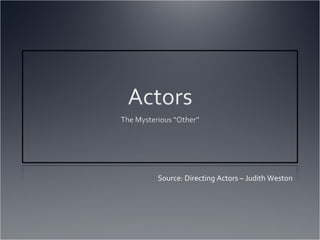
The Care & Feeding of Actors in Cinema
- 1. Source: Directing Actors – Judith Weston
- 2. Introduction Actors are an irrational and baffling ‘other’. Most students graduate from school knowing nothing about techniques of directing actors. The worst thing about low-budget films is usually the acting.
- 3. The Craft of Directing Principles are simple and easy – if you know them. Direction must be objective and usable. You’ve got to let go of doing something right.
- 4. The Craft of Directing Inexperienced Actors (and Directors) are looking for results, they’re looking for performance, they’re looking for the right way to do it – to not make a mistake. Mistakes are not always a bad thing – unlike brain surgery. A mistake can be a blessing in disguise.We need to get excited by mistakes and see where they lead.
- 5. MistakesTeach Us! You will make mistakes.We are mistake making creatures. Your role is to bring creativity and a positive approach to your mistakes, your own and others. A director who projects her own insecurities onto his actors is a very bad thing. “I had no choice” is not a playable choice or decision.You always have a choice. Without freedom, there can be no creativity.
- 6. Opinions are not Intuitions Many people mistake the ‘movie in their head’ for intuition or their ‘vision’. Opinions are easy to have: they require no reflection. Intuition is not the first idea that comes to you – it is the idea that lives with you and comes back to engage you. You need to get below your preconceived ideas and access your deeper resources and imagination. The purpose of technique is to prepare the ground for inspiration and opportunity.
- 7. Technique Rules! Technique allows you: It gives you something to fall back on while you are waiting for inspiration. It makes you think, makes you chose. Learn the Rules and then forget them. Trying to be commercial is just an excuse for not doing the hard work of being original.
- 8. The Actor-Director Relationship Rigorous technique and careful detail go into such associations. Acting and directing are two very different jobs. They are two separate skills. Director asViewer Actor asViewed
- 9. The Actor The actor is exposed and vulnerable. The success of her contribution hinges on her ability and willingness to allow her contribution to be viewed without viewing herself. She must surrender – completely allow feelings, impulses and simple choices without knowing if they are working or not. Actors can (and will) hold back until they decide if they can trust their director’s taste, intelligence and knowledge.
- 10. The Actor’s Job To surrender, to live truthfully in the moment by moment structure created by the circumstance of the material.
- 11. The Director’s Job The responsibility of telling the story He must find the structure to the script and set up events so they are surprising and inevitable. You give the actor direction in order that the actor’s actions and interpretations illuminate and create the events on-screen. The actor has a responsibility to create truthful behavior while following direction and fulfilling the requirements of the script.
- 13. ACTOR AND DIRECTOR MUST RESPECT EACH OTHER’S CREATIVE TERRITORY
- 14. Important Facts We are not dealing with chemistry formula’s here; we are dealing with human beings. Actor and Director work to unlock the sub-world of the script, making discoveries, going places. They can work together in rehearsal, in private and surprise each other.
- 15. “Actors are always at the mercy of the integrity of the director. It’s a leap of faith, and sometimes you leap into the abyss.” Jessica Lange
- 16. “I’ve often described it (the actor/ director relationship) as sexual. I’m his concubine.” Donald Sutherland
- 17. What do Actors want? Knowing when to “Print” (or stop filming)! The worst sin a director can commit is to be satisfied with less that than an actor has to offer. Actors must have confidence that you understand the script, and that the characters and the events that befall them spring to life in your imagination. Your understanding must be communicated. Actors need brief, playable direction.They want to be pushed, to grow and to learn.
- 18. “The goal is to awaken your powers of suggestibility and invention…with love, with passion, with humility” Judith Weston
